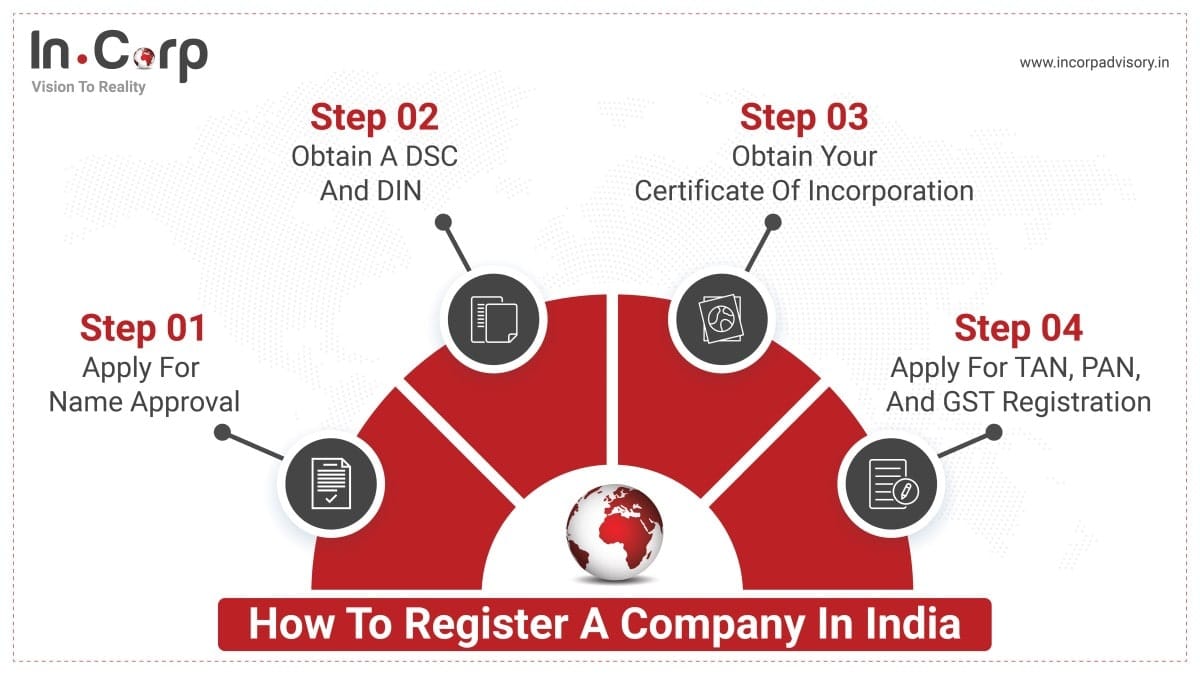Every business in India is required to register itself as part of legal compliance. This article gives you a brief about how to register a company and start a business in India
According to The Ministry of Corporate Affairs (MCA), there were more than 1,50,000 companies incorporated in India in F.Y. 2020 – 2021. India is a major attraction for foreign companies. We have also spoken about the benefits that attract foreign businesses and the types of companies they can register in India.
If done diligently, the company registration process can take as little as 1 month in India. Read till the end to know more about the simple steps involved.
Table Of Contents
Why Should You Choose India To Start Your Company?
What Are The Benefits Of Registering A Company In India?
What Are The Types Of Business Structures Available To Register Your Company In India?
What Are The Requirements To Complete The Company Registration Process In India?
Process for Registration of a Company in India?
Why Choose Incorp?
FAQs on Company Registration in India
Why Should You Choose India To Start Your Company?
India has become one of the most preferred destinations for entrepreneurs & investors over the last decade.
In the latest World Bank’s Ease of Doing Business Report 2020, India stands at 63rd position. As a result, it has become easier for businesses to trade across borders and pay taxes. Moreover the MCA portal also allows companies to complete the registration process online.
What Are The Benefits Of Registering A Company In India?
Some of the benefits of registering a company in India are listed below:
- To bring transparency to the Indian economy, the Indian government has introduced various bills.
- These include the Insolvency and Bankruptcy Code (IBC), Goods & Services Tax bill (GST), and the Direct Taxes Code Bill.
- It made it easier for existing sectors and new international businesses to register a company in India.
- The Government’s initiative ‘Make in India’ also wants to include foreign investments and build manufacturing infrastructures.
Calculate your GST liability with our free GST Calculator
- Globally, India is the leading IT hub, having a registered office here can increase your company’s growth exponentially.
- Also, it has seen success in diverse industries such as E-commerce, Banking & Finance, and Agriculture.
- India has an attractive ecosystem that provides many opportunities for a growing economy.
- Organizations will have no worries about the day-to-day costs of doing business.
- Companies registered in India enjoy cost-effective manufacturing, food, transportation, and labor.
- Besides, India’s dynamic development and growth make it an excellent location for many businesses and investors.
- In order to attract more companies to register in India, the government has created an attractive tax structure by decreasing corporation tax rates to:
- ➔ 22% (down from 30%) for existing companies and
- ➔ 15% (down from 25%) for newly established manufacturing businesses.
Determine your Income Tax by using our Income tax calculator
Apart from low corporate tax rates, there are other incentives offered like:
- Startup India benefits
- No distribution tax on dividends
- Exemption on certain capital gains
Related read: Complete Guide on Corporate Tax And Compliance In India
What Are The Types Of Business Structures Available To Register Your Company In India?
The right business structure helps your enterprise to run efficiently and meet your required business targets.
After you register your company in India, you have an array of business structures available to choose from:
- The most preferred and famous business entity in India is the Private Limited Company.
- Incorporation requires a minimum of 2 shareholders and a minimum of 2 directors.
- In India, Public Limited Company helps businesses to list their company on the Indian Stock Exchange.
- Unlike Private Limited Companies, this business structure can offer shares directly to the public.
- It can also accept Foreign Direct Investments (FDI).
- Incorporation requires a minimum of 7 shareholders.
- Also, no prohibition in the transfer of shares under shareholders’ rights.
- In Partnership firms, the maximum number of partners is 100.
- A registered company has to follow all the guidelines laid down in the Indian Partnership Act.
- Their profits or losses shared are according to the partnership deed. These deeds are created and registered during the formation of a Partnership firm.
- LLP provides a firm with the benefit of limited liability
- It also allows the freedom of organizing the company’s internal management based on a mutually agreed-upon agreement
- An OPC is a business that has only one member.
- The shareholder can only select one nominee.
- In case of the original shareholder’s death or inability, this nominee will become a shareholder.
- Furthermore, the OPC structure allows a sole proprietor to continue to work while being a part of the corporate structure.
- A company registered under Sole Proprietorship in India has only 1 person as the owner who owns all the assets.
- This person also reports revenues of the business along with the personal income tax return.
- No legal formalities are required to establish this business structure other than necessary licensing and business registration.
Foreign investors can also choose amongst the following:
Once the foreign company has finished its registration process, they can also open the following types of offices in India:
- Companies incorporated outside India are allowed to set up Branch Offices (BO).
- They need specific approval from the Reserve Bank of India (RBI).
- The BO should be engaged in the same activity in which the Parent Company is engaged.
- A BO cannot carry out manufacturing activities on its own however, it is permitted to subcontract these to an Indian manufacturer.
- A BO is akin to a foreign Company in India and is taxed @ 40% plus applicable Surcharge and Cess.
- After you have received permission from RBI to set up a branch office in India, there is no limit on the number of years for operations.
- Further, you have to comply with various other conditions.
- Liaison Office (LO) is like a representative office set up to explore and understand India’s business and investment climate.
- LO acts as a communication channel between the parent company overseas and its present or prospective customers in India.
- Further, you may use an LO to establish business contacts or gather market intelligence. This will help to promote the products or services of the overseas parent company.
- LO is allowed to be engaged only in limited permissible activity. It should not undertake any commercial / trading / industrial activity, directly or indirectly.
- The registration certificate for an LO is valid only for 3 yrs with an option of renewal.
- Further, you have to comply with various other conditions.
What are the Requirements to complete the Company registration process in India?
To register a company in India, you need to be aware of the following requirements:
-
- Company NameYour company name has to be unique, which will describe the nature of your business. After finalizing your company name, you need to register with the Ministry of Corporate Affairs (MCA).
Check the availability of your company name
- Local Registered AddressAn Indian company must have a local registered address. The Ministry of Corporate Affairs (MCA) will contact you via post or other means.
- Resident DirectorA minimum of 1 resident director is needed to start a company in India.
The requirements for a Resident Director:
- A natural person (i.e.not a company, and not a business identity)
- A resident of India.
- Minimum 18 years of age.
- ShareholdersThere has to be a minimum of 2 and a maximum of 200 shareholders for a private limited company.
In the case of a public limited company, you will require a minimum of 7 shareholders. There is no limit to the maximum number of shareholders. - Paid-up CapitalThere is no minimum paid-up capital required for setting up a company in India. However, it is advisable to set up a company with the capital which can be used to start initial business operations.

Process for Registration of a Company in India?
You can register your company in India using the simple 4-step process:
- Apply for name approval
- Obtain a DSC (Digital Signature Certificate) and DIN (Director Identification Number)
- Obtain your Certificate of Incorporation
- Apply for TAN, PAN and GST registration
No company can start its operations without obtaining a Certificate of Commencement of business.
Why Choose Incorp?
We understand that corporate and regulatory compliances can be complicated. We are happy to help you navigate these complex regulations.
InCorp has a dedicated team of company secretarial services and business legal professionals, working under the framework of Companies Act, 2013. They have vast experience and knowledge across many sectors for matters ranging from entity incorporation to winding up.
After completing your company registration process, we can also guide you through the initial stages. Avail our services such as annual filings with the ROC and MCA, accounting and bookkeeping, payroll management, and other regulatory services.



